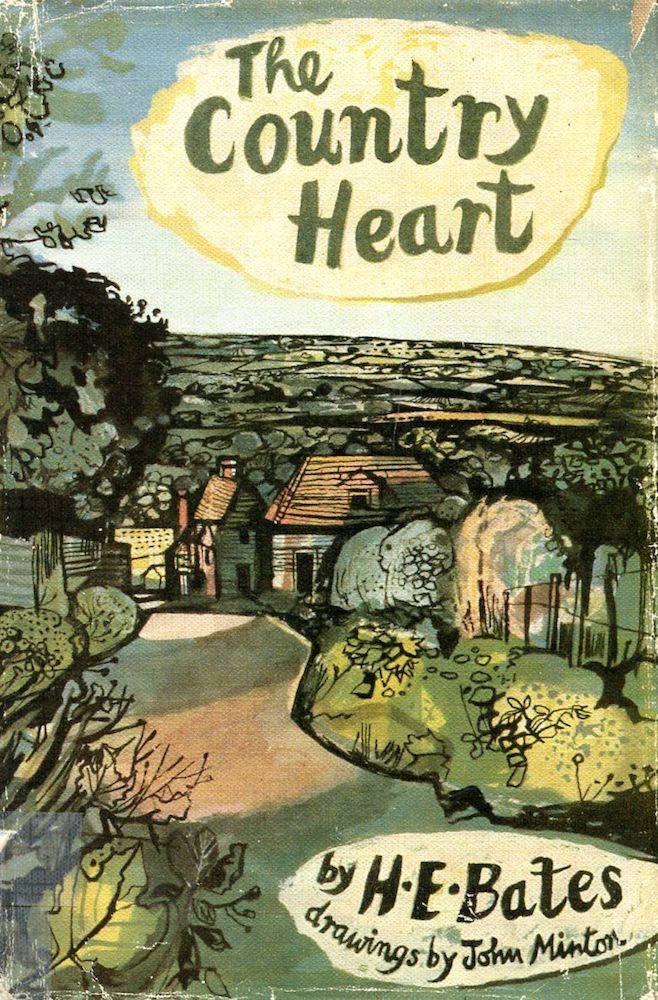
- ID
- a62
- Title
- The Country Heart
- Genre
- Essay Collection
- Page Count
- 239
- Word Count
- 84000
- Publisher
- Michael Joseph
- Publication Year
- 1949
- Document Types
- Autobiographical
- Social Commentary
- Character: Mr Pimpkin(s)
- Topics
- Rural Living
London: Michael Joseph, 1949. Drawings by John Minton.
A reprinting of O More than Happy Countryman and In The Heart of the Country, with the addition of an introduction and an epilogue. An estimated word count for the two earlier works, the revised edition, and two new chapters indicate that possibly Bates reduced the texts by at most 1500 words and that otherwise any revisions were likely to have been small substitutions and alterations. The woodcuts of C.F. Tunnicliffe were replaced by drawings by John Minton.
After the newly-written "Introduction: Yesterday" appear "Part One," containing the fourteen essays that made up In the Heart of the Country, "Part Two" containing the ten essays that made up O More than Happy Countryman, and lastly the "Epilogue: Tomorrow," which had been previously published in 1944 with the title Tomorrow: The Country.
In the introduction, written at Christmas (1948), Bates contrasts the countryside of his childhood with that after two wars; he finds "the things that make up so much of this book" to be largely destroyed and asks whether they are "merely the tender trivialities of one man's recollection or are they eternal things?...They are very dear to me and I am frightened of the answer."
The epilogue, despite being subtitled "Tomorrow," begins with fond reminiscences of Bate's maternal grandfather and paternal great-grandmother and reflections on how they represented the best of the English countryside — "English rural aristocrats of the finest type: gentle, decent, honest, fine to look at, upright and proud" (although Bates uses the term "aristocrats" despite their poverty, hard work, and lack of education). Bates reflects on the continuity of country life for centuries, with industrialization and mechanization bringing slow but unspectacular change, until after the first world war, when the full effect of the internal combustion engine was felt by both town and country. He considers the fusion of town and country to be "one of the few hopeful things in a fairly hopeless world," feeling that in a world increasingly focused on destruction, there must occur a "rediscovery of country life and the countryside" because of the creative power of agriculture. While appreciating what urban life can offer to rural dwellers, he also speculates that the worst examples of prefab urban developments have produced "the means of destroying themselves" through the atom bomb. "Are we really witnessing, not symbolically but actually, the destruction of an era, and being drawn back, with corresponding force, to a life that is closer to earth, the element which sustains us?"
The publisher's statement describes the volume as 'a revised and amended edition' of the two previous volumes (O More than Happy Countryman and In The Heart of the Country) and in doing so introduces an exclamation point in the title of the former book (which also occurred in the first publication of its title essay) and also omits the initial preposition of the latter book. Both changes appear to be errors by the publisher, although a letter by Bates ('Printer's Error') indicates that his original intention was indeed to omit the initial preposition of In the Heart of the Country.
Excerpts from the volume have been published in The Little Kingdom: A Kentish Collection (Richard Church, 1964) with the title "Wealden Beauty" and The Book of the Earth (August Spectorsky, 1957) with the title "The Jobbing Gardener."
The reviewer in The Straits Times wrote that ‘Mr Bates is an author with a great and justified reputation for fine, restrained, writing; his work is like a cool spring, quietly bubbling and occasionally flashing brilliantly in the sunlight. But I cannot think of any other book of his which so completely satisfies as this one.’
Reviews:
- The Straits Times (January 10, 1950, p. 10, attached)
- British Book News (March, 1950, p. 175, attached)
- English Review Magazine (April, 1950, pp. 288-289, A.G. Street, attached)
Contains:
- Introduction: Yesterday;
- Part One: Sudden Spring; Fisherman's Luck; Overture to Summer; Fruit Blossom Time; "Clouded August Thorn; Strange Battlefields; The Great Snow; A Summer Spring; "...Bring Forth May Flowers;" Victorian Garden; Wealden Beauty; The Strangeness of Fish; The Parish Pump; Flowers and Downland;
- Part Two: Et Decorum Est Pro Patria Mori; The Great House; Sea Days, Sea Flowers; Mr. Pimpkins; The Future Garden; The Garden on Leave' The New Country; The Old Tradition; The Green Hedges; O More Than Happy Countryman;
- Epilogue: Tomorrow. (published previously with the title Tomorrow: The Country).

Downloads
The below reviews and articles are available in PDF format.